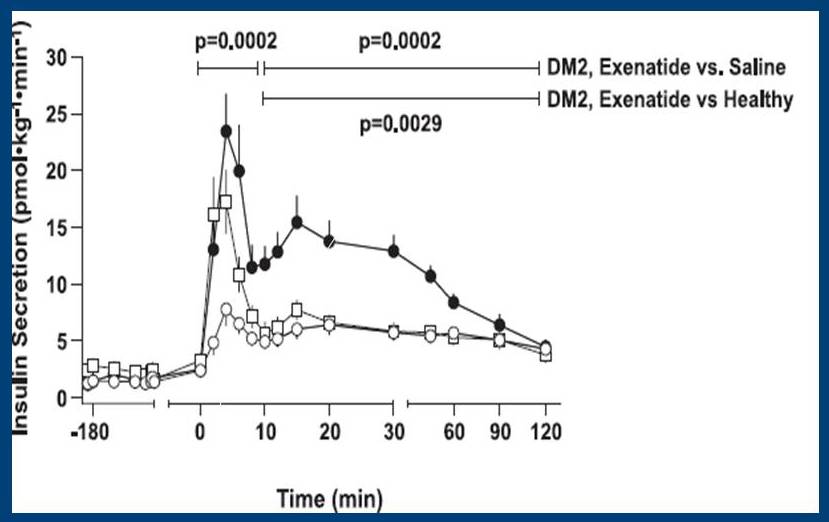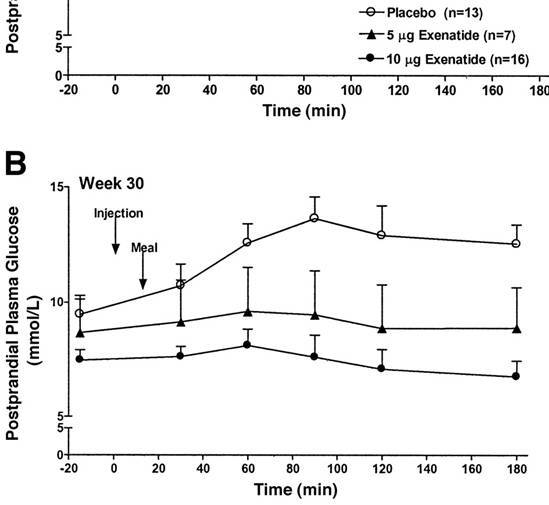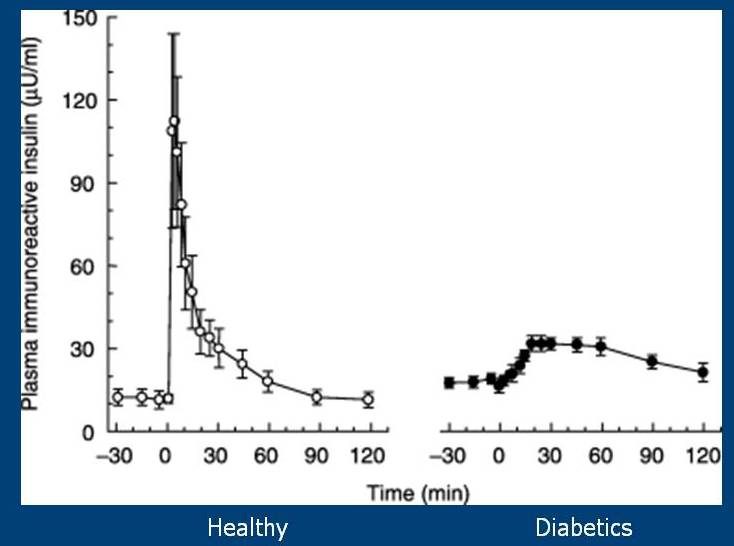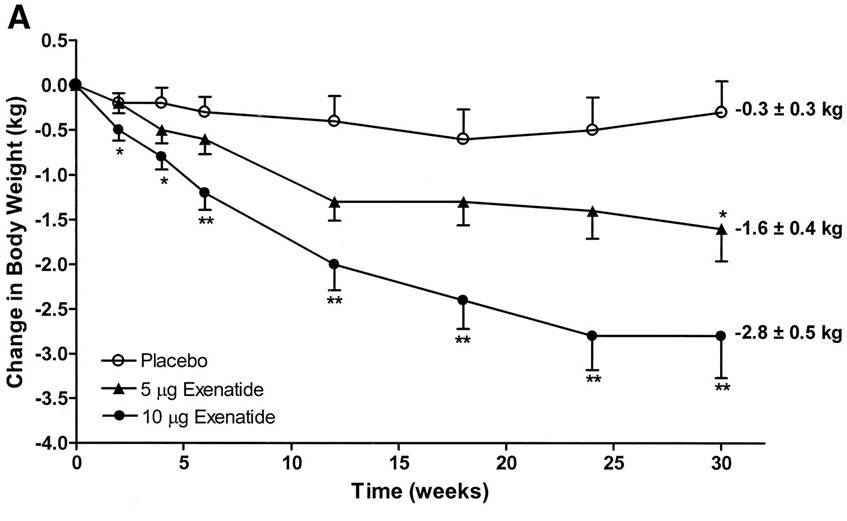In a previous issue of Weightology Weekly, I wrote about insulin and how it's been unfairly demonized by many in the nutrition field. This demonization has been based on a number of misconceptions regarding insulin, its biological effects, and its secretion. I want to continue clarifying these misconceptions.
MYTH: Insulin Spikes are "Bad"
FACT: Insulin Spikes Serve a Normal & Important Physiological Function
In my previous article, I discussed how dietary protein can cause insulin spikes just like dietary carbohydrate, and these spikes are not related to gluconeogenesis from the protein (i.e., the protein being converted to sugar). I also showed how these spikes are partly responsible for the suppression of appetite that is caused by dietary protein (due to insulin's effects on your brain to inhibit appetite).
I want to expand on the importance of rapid insulin spikes due to feeding, and how they are important in blood sugar regulation. To do this, we need to discuss the phases of insulin secretion. Insulin secretion from your pancreas comes in two phases. The first phase happens very quickly; your pancreas senses rising glucose, and insulin is released within 1-2 minutes of this rise in blood sugar. This rapid-phase response is the result of your pancreas releasing stored insulin. It is typically over within 10 minutes. This rapid-phase response has been found to be impaired in people with impaired glucose tolerance (people who have higher blood sugar responses to meals than normal, and higher fasting levels of blood sugar, but who are not diabetic). This rapid-phase response is completely absent in people with type 2 diabetes.
There is a second phase that continues as long as glucose is elevated. This release of insulin is achieved by the release of stored insulin, as well as the creation of new insulin (insulin is created from a precursor called proinsulin). When you infuse glucose into the blood of healthy people and type 2 diabetics, you get insulin responses that look like this:
You can see that the diabetics completely lack the rapid phase response that is present in the healthy individuals.
There is a drug called exenatide (Byetta), which has been found to restore this rapid phase insulin response in diabetics:

Insulin responses of type2 diabetics and healthy individuals, who have been administered glucose intravenously. Circles represent the insulin response of the type 2 diabetics when given a placebo. Squares represent the insulin response of the diabetics when given exenatide. You can see that exenatide restores the rapid phase insulin response. Black circles represent the insulin response of healthy individuals.
This restoration of the rapid phase insulin response improves blood sugar regulation in diabetics:

Blood sugar response to a meal in type 2 diabetics. Circles represent subjects on a placebo. Dark triangles and circles represent subjects on exenatide. You can see that blood sugar remained steady in the subjects on exenatide, but gradually increased in the subjects on the placebo.
You can see in the above chart that blood sugar remained consistent in response to a meal in the subjects on exenatide, but it increased over time in the subjects on the placebo.
Many people like to blame obesity and weight gain on insulin, but exenatide, which restores insulin spikes in type 2 diabetics, causes weight loss:
Part of this weight loss is due to an improvement in satiety. Exenatide is a drug that mimics the effects of a hormone called glucagon-like peptide-1 (GLP-1). GLP-1 is an intestinal insulin-stimulating hormone (known as an incretin). GLP-1 potentiates insulin secretion, enhances the synthesis of insulin, upregulates insulin gene expression, and inhibits glucagon (insulin's opposing hormone) secretion. Yet Exenatide, which mimics GLP-1 and helps stimulate insulin secretion, causes weight loss.
The fact is that rapid insulin spikes in and of themselves are not a bad thing. Protein causes rapid insulin spikes, yet protein reduces appetite and helps with weight loss. GLP-1 and drugs like exenatide contribute to insulin spikes, yet they reduce appetite and cause weight loss. The problem is that people confuse insulin spikes and blood glucose spikes. It is well established that rapid rises and falls in blood glucose can contribute to hunger. Because rapid rises in blood glucose also cause rapid rises in insulin, people end up blaming insulin (and the effects of high glycemic carbohydrates on insulin) for the problem.
MYTH: Since diabetics who inject insulin gain weight, this means that insulin is the reason for weight gain in non-diabetics
FACT: Amylin is co-secreted with insulin in non-diabetics; amylin has appetite suppressant and lipolytic effects
I would like to thank Dr. Stephan Guyenet for this information. I had known about amylin but hadn't looked into it in any great detail. Amylin is a hormone that is secreted by your pancreas at the same time as insulin. Amylin decreases appetite, and also stimulates lipolysis (the breakdown of fat into fatty acids).
Type 1 diabetics do not produce amylin, and amylin secretion is impaired in type 2 diabetics. Pramlintide, a drug that mimics the effects of amylin, has been found to produce weight loss in diabetics.
This information demonstrates that the effects of insulin injection in a diabetic cannot be compared to the effects of physiological changes in insulin in a non-diabetic, yet many people erroneously make this comparison as if they are similar.
MYTH: Lowering Insulin Will Improve Appetite Regulation
FACT: Insulin Is One of the Many Hormones Critical to Satiety
I already most addressed this myth in my previous article on insulin, showing how protein stimulated insulin secretion and helped reduce appetite, and also showing how insulin injection into the brain reduces appetite. I again want to thank Dr. Guyenet for this information, but when you knock out the insulin receptors of a mouse's brain, the mouse will overeat and develop obesity.
MYTH: All of this information only applies to healthy people
FACT: The information applies to obesity and diabetes
On other forums, I saw people comment on my previous article and claim that the information I provided only applied to healthy people, and not diabetics or obese individuals. They continued to believe that treating diabetes and obese individuals was all about insulin control. Nothing could be further from the truth. Not only is this evident from information mentioned earlier in this article (such as how exenatide restores insulin spikes and improves blood sugar control and body weight in diabetics), but it is also evident from the fact that high protein diets have been found to help both diabetics and obese individuals, despite the fact that protein is a powerful stimulus of insulin secretion.
As I mentioned earlier, people seem to confuse blood glucose control and insulin control. It is the management of blood glucose itself that is partly responsible for the health benefits of low-glycemic carbohydrates, or reducing carbohydrates, or increasing protein intake, or consuming dietary fiber, or consuming fruits and vegetables, or consuming whole foods over processed foods. It is not the control of insulin; the control of insulin ends up being a byproduct of these other behaviors through improvements in insulin sensitivity (how responsive your cells are to insulin) and reductions in blood sugar swings.
Remember, insulin is not the bad guy. Click here to read part 3 of this series, where I discuss how dairy products are extremely insulinemic, yet do not promote weight gain.



Mr. Krieger. Thank you for this. Could I ask you of your opinion on this article I saw some time back in Men’s Health? My BF is probably around 12% and I eat well, but I take in a pile of carbs (mix of high and low GI) after heavy weight training every 2nd day and I’m just afraid I’m going to burn out my pancreas eventually. There is a lot of Type 2 Diabetes in my family history as well.
http://www.menshealth.com/men/health/other-diseases-ailments/the-deadly-truth-about-diabetes/article/d4bdb78301459110vgnvcm10000013281eac
Thank you in advance.
Post-workout carbohydrates shouldn’t cause you any trouble in the long-run as you are extremely insulin sensitive after training. As long as you maintain a good diet, good activity, keep your body fat low, and your fasting blood sugar remains normal, then you should be fine.
Thanks James- Couldn’t agree more. Falsification is a key process practiced by far too few, especially in the nutrition/fitness world. I thought it was actually a poignant comment when Robb talked about building a model and then looking for data to support it because without knowing it he exposed one of the main problems with any approach not looking to falsify. They miss the holes in their schema because they are not looking for weaknesses, only strengths and support. Not to uniquely pick on him, he is actually far less guilty of it than many others, just a good single… Read more »
“cherry picking some of the data and ignoring the rest does not make a solid case at all.” This is the norm in the exercise and nutrition industry It is difficult to breakdown a strong Ideological immune system: “Ideological immune system ‘In day-to-day life, as in science, we all resist fundamental paradigm change’ Jay Snelson (social scientist) calls this resistance an ideological immune system. According to Snelson, the more knowledge individuals have accumulated, and the more well-founded their theories have become the greater the confidence in their ideologies. Consequence we build up and “immunity” against new ideas that do not… Read more »
This is an excellent series on insulin James- great work. Enjoying the other articles as well. I had the comment about the misuse of Occam’s Razor on Alan Aragon’s blog that you commented on. I find that the misinformation out there about insulin and carbohydrates that is touted by many low-carb dogmatists ties in nicely with the logical fallacies post as well. In my second comment here (scoll down about 1/3 of page): http://robbwolf.com/2010/03/02/the-paleolithic-solution-episode-17/ I address the confirmation bias at work when a popular paleo blogger looked at the Okinawan diet and credited the positive results from a high-carb diet… Read more »
Preston, Thanks for your comment. That was a great comment you made on the misuse of Occam’s Razor, and thanks for linking to your comments on Robb’s site. By the way, I love your statement here from Robb’s site: “I prefer the ‘construct a model and then look for data to DESTROY it’ method. “ This is so true. I try to do the same thing myself. I’m always asking the question, “Is this really true?”, and then look how the information can be potentially falsified. The process of falsification is a very important part of the scientific process and… Read more »
Some people have argued that Okinawans eat lots of pork, like this non-scientific site
http://www.wonder-okinawa.jp/026/e/pork.html
I am wary of anyone trying to definitively state the Okinawan diet without lots of evidence.
Never mind, I didn’t read the first comment by Preston carefully.
“low-carb means low-insulin means no fat accumulation” theory”
Don’t think this claim has reached status as scientific theory, but could be described as an unfounded hypothesis
>> could be described as an unfounded hypothesis
Yes, I confuse the layman’s definition of theory with the scientist’s definition.
Wouldn’t it be funny if insulin is required to get Leptin into the hypothalamus, or other wrench in the “low-carb means low-insulin means no fat accumulation” theory?
After all, isn’t glucose required for the adipocytes to make leptin in the first place?
Mr. Hale quoting Freedman and colleagues
>>…genetic disruption of insulin signaling in the brain leads to increased food intake and obesity in animals …demonstrating that intact insulin signaling in the central nervous system is required for normal body weight regulation
Great stuff Mr. Krieger you’re educating me to no end … a vicarious thanks to Dr. Guyenet as well.
Something i’ve been seeing for a while & can’t find the answer to (yet) : why doesn’t acylation stimulating protein make type 1 diabetics fat without injected insulin?
Hope this is a quick and easy answer for someone whose biochem is more recent than mine.
Sam, This will be addressed when I write the 3rd part of this series. One of the big misconceptions of insulin is that it stimulates lipogenesis. While this is true, this effect is very weak. Insulin’s main function in the body is not stimulatory…instead it is inhibitory. Insulin acts as a brake on lipolysis, gluconeogenesis, proteolysis, and ketogenesis. Without insulin and this brake, these processes go forth unregulated at very high rates. Lipolysis and ketogenesis then proceed at extremely high rates, and ASP simply can’t make up for the runaway lipolysis and ketogenesis. You also have runaway gluconeogenesis and proteolysis.… Read more »
“The bottom line is that, the “high refined carbohydrate causes high insulin which causes obesity & disease” is overly simplistic and fails to explain numerous experimental and epidemiological observations.”
Definitely over simplified, common case of mistaken correlation with causation. As James points out many individuals who eat tons of so-called junk food maintain lean physiques and don’t suffer from insulin resistance. And on the other end, eating super clean can result in obesity- e.g. Sumo Wrestlers,- and increase the chances of IR
“MYTH: Lowering Insulin Will Improve Appetite Regulation FACT: Insulin Is One of the Many Hormones Critical to Satiety” Furthermore, Freedman and colleagues (2001, Popular Diets: A Scientific Review) point out: The role for insulin in the synthesis and storgage of fat has obscured its important effects in the central nervous system, where it acts to prevent weight gain… …genetic disruption of insulin signaling in the brain leads to increased food intake and obesity in animals …demonstrating that intact insulin signaling in the central nervous system is required for normal body weight regulation Increased insulin secretion has been suggested to protect… Read more »
Fact: Insulin Resistance goes hand in hand with Leptin resistance. Take a fat guy and give him a Leptin boost and he still eats more and gets hungry. So this does, in fact, only apply to healthy people.
Mike, insulin resistance does not always go hand in hand with leptin resistance. I suggest you provide evidence when you make such assertions
This is fascinating. One of the key hypotheses in Good Calories, Bad Calories (a book I know that you do not endorse in any way) is that insulin is related to many diseases that are part of so-called metabolic syndrome: diabetes, heart disease and cancer to name three big ones. Would you agree that eating refined carbohydrates is likely a (not necessarily “the”) cause of these diseases, but through, in your words, “insulin sensitivity (how responsive your cells are to insulin) and reductions in blood sugar swings.”? If so, can you elaborate the mechanism of how eating refined carbohydrates and… Read more »
Jerrmy, Refined carbohydrate can result in reduced satiety due to the rapid drops in blood glucose that occur after the rapid rises. In turn, the overconsumption of energy intake that is not met by an increase in energy expenditure would result in deposition of fat. This fat, in turn, would result in a rise in NEFA’s in the blood, which would then lead to insulin resistance. Thus, in this model, the problem is still overconsumption of calories. This is supported by research showing that, when you control energy intake so that subjects are in energy balance, consumption of refined carbohydrate… Read more »
Your points on the large postprandial insulin spike not being deleterious are reasonable. However, I am not so certain your cavalier treatment of fructose is correct. You said: “Now, there are a percentage of people who drastically overconsume certain nutrients like fructose or sucrose (some of the clients in our clinic would come in drinking 10-20 cans of soda per day), and in these cases, these habits are likely contributing to insulin resistance directly. But when you look at survey data, many people don’t fall into these extremes.” Couldn’t it be possible, even likely, that the threshold for fructose induced… Read more »
I don’t think the author endorsed drinking any amount of soda. But is it really likely that one can of soda a day for life would produce insulin resistance? You seem sure it will, but what evidence do you have?
Insulin resistance is typically found in the overweight and pre-diabetic.
Drinking 1 can of soda a day regularly may be a factor in some people being overweight, but it doesn’t directly cause insulin resistance.
There’s nothing worse than some moron who isn’t a scientist, trying to talk like a scientist. Shut the fuck up Derek.
Unless you personally know Derek, then you don’t know what his background is. He’s asking a perfectly reasonable question – why is that a problem? Or is the blog author only supposed to accept comments that conform to his world view and meet with your approval?
Fructose is no limited to what enters through your mouth. It has been found that people with hyperglycemia (high blood sugar) convert glucose to fructose at ten times the normal rate. What matters is what reaches your bloodstream, not what you eat. Also, can we PLEASE stop saying “refined” carbohydrates?! That has little or nothing to do with anything – and it means very different things for different foods. The only thing that matters is the GLUCOSE or fructose which reaches your blood stream. In that, for most foods, it doesn’t make a rat turds worth of difference whether the… Read more »
I would also note that there’s a lot of data that large postprandial glucose fluctuations and postprandial hyperglycemia directly contribute to disease processes through increasing oxidation of tissues, inflammation, and endothelial dysfunction. There is quite a bit of evidence for this, which is why poorly controlled diabetics are at a higher risk of disease. Again, in this case, it is not insulin that is causing the disease. Disease is being caused by the fact that insulin isn’t working like it’s supposed to work.
Thanks for the detailed explanation!
To boil it down, overeating leads to insulin resistance through fat accumulation. Insulin resistance itself and the consumption of certain carbohydrates may contribute to disease through “increasing oxidation of tissues, inflammation, and endothelial dysfunction.” Is that right?
The Wikipedia article on insulin resistance links to this article on glucose receptors, suggesting that insulin directly downregulates these receptors.
http://www.ncbi.nlm.nih.gov/pmc/articles/PMC45693/?tool=pmcentrez
Would you disagree that this type of direct downregulation is a major force in insulin resistance in humans?
Jeremy, The problem with the study you reference is that it is an in vitro study, and is not necessarily relevant to what happens to humans in vivo. That said, I do agree that chronic hyperinsulinemia can exacerbate insulin resistance. However, we have to not confuse chronic hyperinsulinemia with high insulin levels caused by diet. They are not the same thing. Chronic hyperinsulinemia means insulin is elevated above normal 24 hours a day; even fasted levels are elevated. This is not the same thing as elevations in insulin caused by meals (even high-carb meals), which are characterized by swings in… Read more »
What is causing insulin resistance according to yourself?
Why is it that long-lived people have this one attribute alike:
Low levels of insulin.
There are numerous causes of insulin resistance, including caloric surplus (of any kind), physical inactivity, psychological stress, etc.
First, you need to define exactly what a “low level” of insulin is. Do you have evidence that insulin levels are associated with longevity?
Second, insulin levels are a result of insulin sensitivity. Chronically high insulin levels are the result of insulin resistance, not the other way around.
If you’re talking about the existing population of T2s, it is nearly impossible to separate the two phenomenon in the data we have. That’s because that vast majority of T2s who have high glucose also have high insulin. Just as in normal people, the two follow each other. The difference being that in T2s BOTH go way too high. It seems clear that each of them are harmful. We’ll need a lot more data to sort out the relativity of it all.